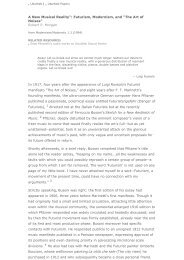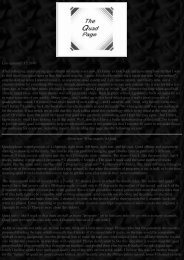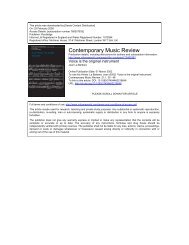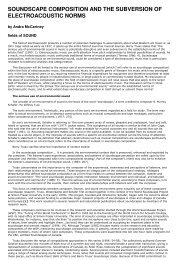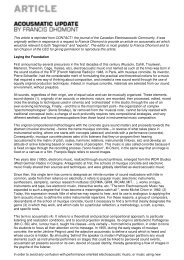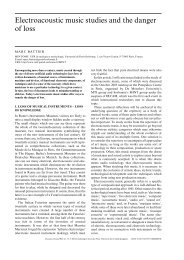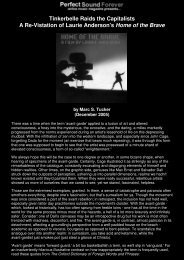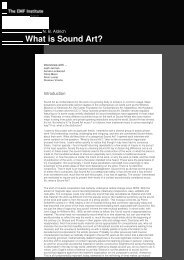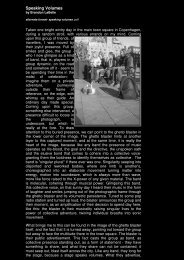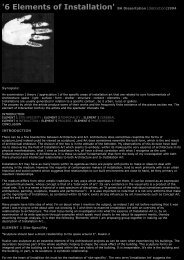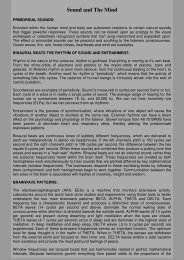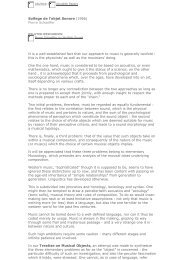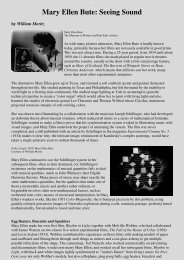'Sound art, radio art,and post-radio performance in Australia ...
'Sound art, radio art,and post-radio performance in Australia ...
'Sound art, radio art,and post-radio performance in Australia ...
You also want an ePaper? Increase the reach of your titles
YUMPU automatically turns print PDFs into web optimized ePapers that Google loves.
<strong>and</strong> just to survive I had to <strong>in</strong>ject a fair amount of humour <strong>in</strong>to the act. I didn't st<strong>art</strong> among technological<br />
people, I suppose. I worked out a way of do<strong>in</strong>g it just with my vocal chords alone ... I do the <strong>performance</strong><br />
first, <strong>and</strong> then I notate it afterwards. It's actually worked out on the night, <strong>in</strong> front of the audience, with sweat<br />
runn<strong>in</strong>g off me, <strong>and</strong> sweat runn<strong>in</strong>g off them.<br />
As becomes evident, Duke favours live, real time <strong>performance</strong>, <strong>and</strong> considers the sense of communion shared by the<br />
simultaneously sweat<strong>in</strong>g poet <strong>and</strong> audience to be an essential aspect of sound <strong>performance</strong>. Not surpris<strong>in</strong>gly, he criticises<br />
the dramatic limitations of purely sonic, technological presentation.<br />
I th<strong>in</strong>k one of the least impressive th<strong>in</strong>gs of new music or electronic music is the actual lack of visual impact<br />
<strong>in</strong> the <strong>performance</strong>. The performer's sitt<strong>in</strong>g at a control desk, madly twiddl<strong>in</strong>g knobs, <strong>and</strong> even though the<br />
sounds might be tremendous, the actual visual impact of the <strong>performance</strong> is nil. I'd rather have Pagan<strong>in</strong>i<br />
play<strong>in</strong>g his viol<strong>in</strong> or Elvis Presley <strong>and</strong> his guitar, or someth<strong>in</strong>g like that. I th<strong>in</strong>k the visual p<strong>art</strong> of a<br />
<strong>performance</strong> is quite important.<br />
Duke concedes that his own eccentric appearance <strong>and</strong> mannerisms probably account for his enthusiasm for visual modes<br />
of <strong>performance</strong>, <strong>and</strong> f<strong>in</strong>ally admits that he too might be tempted by technology, were he offered the opportunity.<br />
The fact that I am a slightly bizarre look<strong>in</strong>g character, I suppose, with a bald head <strong>and</strong> a big beard <strong>and</strong> a big<br />
belly - that sort of adds to the <strong>performance</strong>, I th<strong>in</strong>k. Also, I tend to dress <strong>in</strong> a casual, rough way. I'm<br />
pretend<strong>in</strong>g to be unsophisticated, when I'm not: it has all this actor's deception type of th<strong>in</strong>g. But I suppose if<br />
someone were to come along <strong>and</strong> say: 'I've got this terrific studio, <strong>and</strong> it will be all at your services", I could<br />
become a technologist. I'd have to go back to school, I suppose, <strong>and</strong> learn the A.B.C. of technology. I'm not<br />
really aga<strong>in</strong>st it as such.<br />
Duke's comments typify two recurrent dilemmas of the contemporary sound <strong>art</strong>ist: a sense of reservation regard<strong>in</strong>g the<br />
validity of technological <strong>performance</strong>, <strong>and</strong> a sense of frustration regard<strong>in</strong>g the <strong>in</strong>accessibility of technological hardware.<br />
Firstly, as Duke remarks, even when advanced technology allows the <strong>art</strong>ist to twiddle knobs <strong>in</strong> real-time, such<br />
<strong>performance</strong> has very limited visual impact when compared with more conventional modes of physical stage presence.<br />
Nevertheless, one might well retort that real-time technological <strong>performance</strong> <strong>in</strong>volv<strong>in</strong>g the live manipulation of sound,<br />
does <strong>in</strong>troduce a new, somewhat m<strong>in</strong>imal, sense of drama, as one learns to focus upon the movements of the <strong>art</strong>ist's<br />
h<strong>and</strong>s <strong>and</strong> face, rather than await<strong>in</strong>g more familiar, melodramatic movement.<br />
Considered <strong>in</strong> a rather different context, <strong>in</strong> terms of Jean Baudrillard's meditations upon the 'ecstasy of communication',<br />
the realm of scenic pleasure might be said to mutate <strong>in</strong>to 'pure fasc<strong>in</strong>ation'. Baudrillard rather ambiguously associates<br />
this state with positive 'orig<strong>in</strong>al' sensations, <strong>and</strong> with a seem<strong>in</strong>gly negative 'new form of schizophrenia' precipitated by<br />
vertig<strong>in</strong>ous awareness of the 'perpetual <strong>in</strong>terconnection of all <strong>in</strong>formation <strong>and</strong> communication networks'. 41 Obviously,<br />
real-time technological <strong>performance</strong> need not necessarily produce this 'foul promiscuity of all th<strong>in</strong>gs'. 42 Baudrillard's<br />
supposition wallows <strong>in</strong> wild exaggeration: even theorists sometimes just want to have fun. All the same, as Baudrillard<br />
notes <strong>in</strong> one of his more sober paragraphs, technology may <strong>in</strong>troduce substantial changes both to <strong>art</strong> <strong>and</strong> to our responses<br />
to <strong>performance</strong>. In this respect, one might p<strong>art</strong>ially share his hypothesis that:<br />
Pleasure is no longer that of the scenic or aesthetic manifestation (seductio) but that of pure fasc<strong>in</strong>ation,<br />
aleatory <strong>and</strong> psychotropic (subductio). This does not necessarily imply a negative judgement, s<strong>in</strong>ce the<br />
forms of pleasure <strong>and</strong> perception undoubtedly undergo a profound <strong>and</strong> orig<strong>in</strong>al mutation ... In apply<strong>in</strong>g our<br />
old criteria <strong>and</strong> the reflexes of a "scenic" sensibility, we run the risk of misconstru<strong>in</strong>g the irruption of this<br />
new ecstatic <strong>and</strong> obscene form <strong>in</strong> our sensorial sphere. 43<br />
Baudrillard himself misconstrues the difficulty of evaluat<strong>in</strong>g such new mutations of 'scenic' <strong>performance</strong>. As Duke<br />
observes, new k<strong>in</strong>ds of technological <strong>performance</strong> may often easily be evaluated as <strong>in</strong>consequential displays of<br />
'tremendous talent <strong>and</strong> no content'. 44 In his turn, Larry Wendt offers much the same verdict with regard to the new<br />
conservatism <strong>and</strong> the new commercialism <strong>in</strong> American electro-acoustic music:<br />
In a way I suppose electro-acoustic music has become a bankrupt <strong>art</strong> form as a result of this commercial<br />
<strong>in</strong>trusion - the 'low-road' stuff though more accessible has become <strong>in</strong>creas<strong>in</strong>gly moronic, while the 'highroad'<br />
stuff rema<strong>in</strong>s difficult to obta<strong>in</strong> on record<strong>in</strong>gs <strong>and</strong> often too <strong>in</strong>terested <strong>in</strong> justify<strong>in</strong>g its existence through<br />
excessively academic <strong>post</strong>ur<strong>in</strong>gs. There seems to be very little <strong>in</strong> terms of explor<strong>in</strong>g wildernesses or wild<br />
experimentalism <strong>in</strong> the field. 45<br />
While Wendt <strong>and</strong> Duke have reservations about many recent developments <strong>in</strong> technological <strong>performance</strong>, they clearly



